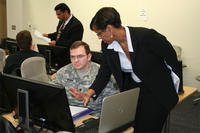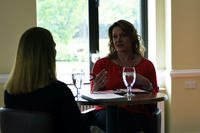Trying to get a job straight out of school? Or a stay-at-home mom trying to get back into the work force? If you are looking at your resume and it reads like a blank page, you are not alone.
But a blank resume does not have to be an application killer for military spouses. Follow these five tips and make that resume work for you.
Related: Does your resume pass the 6-second test? Get a FREE assessment.
1. Sell Your Skills, Not Your Experience.
Take a lesson from former Yahoo CEO Scott Thompson: Don't make up experience you don't have. Instead of being embarrassed by your empty resume, keep in mind that everyone starts somewhere.
"My mom reminded me that everyone starts somewhere," says Navy wife Stephanie. Stephanie married her sailor straight out of high school. By 19, she was pregnant. "It made sense to stay home with him once he was born," she said of her son. "When he started school, I needed to go to work. And I had nothing on my resume. No job ever."
The good news is this: Stephanie is happily employed today at a Hampton Roads hotel. She works the front desk and is being tracked for management. "They hired me because I had all the skills they needed even if I had no experience," she says.
What does a skill-based resume look like? Monster.com has a very helpful example resume that lists skills in its own section near the top of the resume.
If you have fewer marketable skills than these, think in broader terms. You are probably proficient at various software products that would be useful in an office environment. Maybe you have strong social media skills, have taken on leadership roles in volunteer or extracurricular organizations, or perhaps you have great people skills.
No one expects you to have a professional history to match these when you are straight out of school, but they do expect you to tell them what skills you offer and how you have honed them.
2. Showcase Your Volunteer Work or Academic Projects.
No one needs to know how you learned to be proficient at Microsoft Word or PowerPoint in high school, but if you are going to present yourself as a young leader, communicator or organizer, the person reading your resume will want to know why you think you are good at those things. You can tell them all about it in a "Volunteer Experience" or "Relevant Volunteer and Academic Experience" subheading on your resume.
If you led a church mission, wrangled a PTA into the black, or organized an event for a group in your area, these experiences can be of interest to a potential employer. They tell the interviewer that this person might not have work experience, but they do have a different experience that has yielded the same knowledge.
If you were an athlete in school, you probably have relevant team experience that you could add to this section that shows you are a reliable team player and leader. Take this opportunity to show how those experiences gave you valuable lessons and skills you will carry into the workplace. As Stephanie's mother said, everyone has to start somewhere, and chances are high that you have more marketable experience than you realize.
3. Write a Killer Cover Letter.
Every job application should include a cover letter. Every single one. Even a job application for a position in the checkout line at the grocery store can include a cover letter. Why? Because it is the only introduction you might have to your future employer.
"I wrote a cover letter to get a job at Claire's," says Kathi, a Coast Guard wife living in Tampa who moved to be with her husband and had no local job connections. "No job experience, no connections. It was brutal," she remembers.
Kathi had worked seasonally at her local mall in high school, but because she was a varsity athlete, she did not have time to hold down a real job in addition to school. "I had a little experience, but my supervisors had all gotten new jobs and I didn't have their contact info," she says. "So I worked for a few weeks but had no references."
Kathi was worried that would mean she would have no one to speak on her behalf, so she took the opportunity to speak for herself. "I thought cover letters would be for bigger jobs, but my boss said she gets cover letters all the time. She said that it's a good way to learn about someone."
Most employers share Kathi's boss's approach. A cover letter is a reasonable expectation from any recent graduate or someone who lacks the professional history a stand-out resume might have.
Your cover letter should be the thing that ties the skills and experience you do have (and have highlighted in your resume) with the needs and goals of the company, as well as the demands of the position you are specifically applying for. "Make sure you don't send the same one to every job," suggests Kathi. "Make sure it looks like you cared about this job so much you wrote one just for it."
Better yet: Do write your cover letter specifically for every position. The personalization comes through and shows you take the position seriously.
4. Include a Clear Career Goal.
Many resumes include a career goal listed at the top or a bland summary of what a job seeker is looking for in a position. While these are not always a good idea, they are very important for a resume with no real work experience.
Here, in approximately three clearly written, concise sentences, highlight the experience and skills you have that are most relevant for the job to which you are applying and tie them in with your long-term career plans.
Doing so shows your prospective employer two important things: First, that you actually have the skills it takes to get the job done, and second, that you actually have a plan to put that job to use in the long run, demonstrating that the job will actually be as important to you as it is to the organization.
"What if you're just getting a job because you need the money?" asks Kathi. That's a good question and an answer you will need to creatively construct in your professional summary/goal section.
If your career goals do not align at all with the job you are looking at, you may want to rethink the position. But no matter what kind of job you are applying for, you will probably learn a lot on the job that will help you as you pursue your long-term goals. Focus your written goals on those skills you hope to master. Doing so will show the reader that you will get as much out of the job as you put into it, which makes you a good prospect for employment.
5. Don't Wait for Your References to Be Called.
Every time we suggest that you include written references with a resume or job application, someone cringes -- and in their defense, it is not typical job seeker behavior.
But for military spouses constantly on the move, juggling the demands of military life, and in many cases starting their careers afresh at a new duty station, those references are absolutely critical. If you lack professional experience, you can play up extracurricular experience that your references can actually support. Instead of just saying yourself that you are a good leader, you prove that someone else thinks you are a good leader, too, by including letters of reference.
But without a strong job history, who can you turn to for those references? Look to former academic advisers, teachers or club supervisors. If you have strong volunteer experience, ask the people in charge to write letters on your behalf that support the skills you claim to have. Each reference should be able to speak to a different skill set you have mastered or volunteer experience that lends itself to job readiness.
While that seems easy enough in theory, these references can be difficult to ask for in real life. Be straightforward with people: The people you might ask to be references are people who also believe in you and your potential.
Ask them to look over your resume and if they might be willing to write a letter of reference on your behalf speaking to something you specifically mention. Let them know that because of your shorter job history, you are hoping your resume can stand out with impeccable references already included. No matter how awkward you feel asking, your application will be stronger for it.
Applying for work with little work history is never easy, but it does not have to feel impossible. With these five tips, you can make your resume stand out -- even if there are not many jobs listed on it.
Looking for more job tips?
Sign up for a free Military.com membership to have military news, updates and job resources delivered directly to your inbox.























